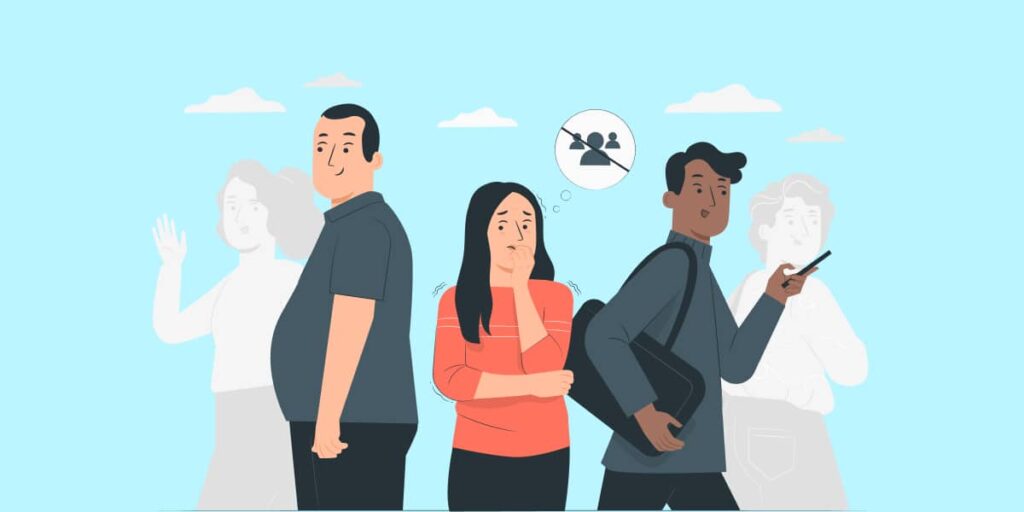In a world that’s constantly connected – through school, work, or social media – speaking up, making eye contact, or walking into a room full of people can sometimes feel overwhelming. It’s completely natural to experience a flutter of nerves before a big presentation or to feel a bit awkward in unfamiliar settings. Many people describe themselves as “shy” or “socially reserved,” and for some, that’s simply part of their personality.
But for others, this discomfort goes beyond occasional nervousness or introverted tendencies. It becomes a daily battle that interferes with relationships, careers, and self-worth. What may initially seem like shyness could, in fact, be something more intense and persistent, something that impacts one’s ability to function comfortably in everyday life. That “something” might be social anxiety disorder.
The line between shyness and social anxiety isn’t always easy to spot. But understanding the difference is not only important for emotional well-being, it also promotes greater self-compassion and awareness. Knowing when to seek professional help can be a life-changing turning point for those struggling silently.
So, how do we know where shyness ends and social anxiety begins? How can someone tell if they just prefer quiet environments or if they’re dealing with something deeper that needs attention? In this article, we’ll explore the key differences between shyness and social anxiety, uncover the signs of a more serious mental health issue, and highlight when it’s time to reach out for support. Everyone deserves to live a life that feels empowered, confident, and free from unnecessary fear.
Understanding Shyness: A Common Personality Trait
Shyness is a personality trait that many people are born with or develop over time due to experiences. Shy individuals tend to feel uncomfortable or awkward in unfamiliar social situations. They might avoid being the center of attention, speak softly in groups, or take longer to warm up to others. But crucially, shyness doesn’t necessarily lead to distress or avoidance that disrupts daily life.
For shy people, once they become familiar with others or adjust to a setting, they can usually function well. They may prefer small gatherings over big parties and need time to recharge after social events. However, they still maintain relationships, attend school or work functions, and engage with others when needed. Their discomfort is manageable and doesn’t impair their functioning.
Shyness is not a disorder; it’s a temperament, and it varies in intensity. Some shy individuals may even become more socially confident with age, practice, or supportive environments.
Defining Social Anxiety Disorder: More Than Just Being Shy
Social anxiety disorder (SAD), on the other hand, is a mental health condition that goes beyond mere discomfort. It is marked by an intense, persistent fear of being judged, embarrassed, or rejected in social or performance situations. This fear can be so overwhelming that individuals begin to avoid these situations altogether, even when it means missing out on important opportunities.
Unlike shyness, social anxiety is not something someone simply “grows out of.” It can manifest as severe physical symptoms like sweating, trembling, nausea, rapid heartbeat, and even panic attacks. Emotionally, it can lead to a cycle of self-criticism, low self-esteem, and loneliness. People with social anxiety often replay interactions in their minds, obsessing over what they said or did wrong, and anticipate future events with dread for days or weeks.
Social anxiety disorder affects relationships, academic and professional performance, and overall quality of life. It’s estimated that nearly 15 million American adults experience social anxiety disorder, making it one of the most common mental health conditions in the country.
Key Differences Between Shyness and Social Anxiety
While they can appear similar on the surface, understanding the differences is vital:
- Intensity and Duration: Shyness might fade over time in a given situation. Social anxiety is intense, chronic, and often irrational.
- Impact on Life: Shyness doesn’t necessarily prevent someone from living their life. Social anxiety causes people to avoid situations, harming relationships and opportunities.
- Emotional Response: Shy people might feel nervous, but not distressed. Those with social anxiety may experience dread, shame, and panic.
- Physical Symptoms: Social anxiety can bring intense physical reactions that are absent or mild in shyness.
Think of shyness as a preference for quieter social experiences. Social anxiety is a barrier to engaging in any social experiences due to overwhelming fear and distress.
Signs It Might Be Time to Seek Help
Many people live for years believing that their social anxiety is “just shyness” or that they’re simply introverted. While introversion is about where you get your energy from (preferring alone time), social anxiety is about the fear of social situations. Recognizing when it’s more than shyness is a crucial step.
You or a loved one might want to seek professional help if:
- The fear of being judged, embarrassed, or rejected is extreme and constant.
- You avoid social or performance situations altogether.
- The anxiety causes distress in school, work, or personal relationships.
- You experience panic attacks or physical symptoms in social situations.
- You feel hopeless or depressed about your ability to interact socially.
- The anxiety has lasted for six months or more and seems to be getting worse.
If any of these signs sound familiar, know that you’re not alone and that help is available, effective, and life-changing.
The Power of Early Intervention
Social anxiety disorder is highly treatable, but many people don’t seek help because they feel ashamed or assume it’s just part of their personality. Others fear that treatment might involve confronting the very situations that cause their distress. But therapy, particularly Cognitive Behavioral Therapy (CBT), offers a structured, supportive way to understand and gradually reduce anxiety.
CBT helps individuals identify the negative thought patterns that fuel their fears and replace them with healthier, more balanced thinking. It often includes exposure therapy—a gentle, guided approach to facing feared situations. With time and practice, people learn they can handle social situations without catastrophic outcomes.
In some cases, medication may also be recommended, especially when symptoms are severe. Selective serotonin reuptake inhibitors (SSRIs) are commonly used and can help reduce anxiety levels, making it easier to engage in therapy.
Support groups, mindfulness techniques, and even lifestyle changes like regular exercise, improved sleep, and reduced caffeine intake can also play important roles in recovery.
Living Fully – Not Fearfully
Everyone deserves to participate in life without being ruled by fear. Whether you’re a naturally quiet person or someone facing the heavy burden of social anxiety, your voice matters, and your presence is valuable. Professional support is not about changing who you are; it’s about giving you the tools to live freely, confidently, and authentically.
Learning to manage social anxiety isn’t about becoming the life of the party or never feeling nervous again. It’s about reaching a point where social situations no longer control your choices, relationships, or happiness. Imagine being able to speak up in meetings, attend events without dread, or strike up a conversation without fear; that’s the kind of freedom therapy can bring.
Finding the Right Help at the Right Time with Silver Lining Psychiatry
Recognizing the signs of social anxiety disorder and distinguishing it from everyday shyness is a powerful first step. But even more important is knowing where to turn when support is needed. Mental health struggles, especially those tied to social interaction, can feel incredibly isolating, but help is closer and more accessible than many realize. Therapy and treatment options have come a long way, offering real, lasting relief for individuals battling the weight of social anxiety. If you or someone you care about is struggling, taking that next step toward professional help can open doors to clarity, confidence, and connection.
That’s where Silver Lining Psychiatry comes in. Known for their compassionate, patient-centered approach, Silver Lining Psychiatry offers expert mental health care tailored to your unique needs. They specialize in diagnosing and treating social anxiety disorder, shyness-related challenges, and a wide range of mood and anxiety disorders. Whether you’re seeking therapy, medication management, or both, their team of experienced professionals provides supportive, stigma-free care in multiple convenient locations: Orlando, Windermere, Oviedo, and Winter Park. Silver Lining Psychiatry understands that healing starts with trust, and they work tirelessly to create a space where you can feel safe and heard. If you’re ready to take the next step, Silver Lining Psychiatry is here to guide you.
In addition to social anxiety treatment, Silver Lining Psychiatry also offers comprehensive services including ADHD evaluation and treatment, depression and mood disorder management, trauma therapy, and psychiatric support for children, adolescents, and adults. Their multidisciplinary team is equipped to address complex mental health needs with empathy, experience, and individualized care plans. Support is out there, and healing is possible. Social anxiety doesn’t define you; it’s just one chapter in your story. No matter where you are on your mental health journey, having the right team by your side makes all the difference, and Silver Lining Psychiatry is committed to helping you find your way to a more empowered, fulfilling life.





